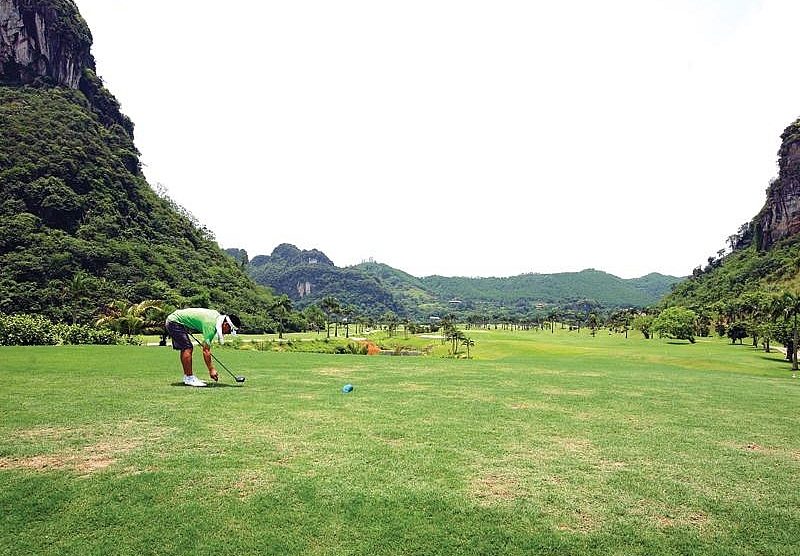Investment in golf courses will be managed by conditions drafted by the Ministry of Planning and Investment, instead of an overall planning.
Prohibited activities
After a long wait, the draft decree on conditions for investing and doing business in golf courses has been prepared by the Ministry of Planning and Investment (MPI) and has been released for public comments. A range of conditions for the golf course business have been revealed.
Bui Tat Thang, head of the Development Strategy Institute under the MPI previously shared with VIR that the conditions on golf course business have been drafted in a “very strict manner, ensuring the proper and efficient use of land.”
Over the past four years, the Government has decided to add more golf course projects to the planninh, including the Kenh Ga – Van Tien golf course project (Ninh Binh province), FLC Quang Binh Golf Links (Quang Binh province), Ben En golf course (Thanh Hoa), Viet Yen golf course (Bac Giang province).
The draft also stipulates that each golf hole should not use more than five hectares of land, thus maximising the construction area at 270ha (54 holes).
In addition, investors in golf course projects are not allowed to use the allocated land to build commercial housing or turn it to other purposes and the construction must be finished within 36 months since the date the land is allocated or the lease decision is issued. At the same time, investors have to commit to support resettlement and arrange jobs for people whose land is recovered under compensation and resettlement schemes.
According to the draft decree, the types of land that must not be used for the construction of golf courses include: land allocated for national defence and security by competent state agencies; land area designated as national forest land by the planning; rice cultivation land, except one-crop paddy fields with low productivity that are eligible to convert their land use purposes.
Land for industrial parks, industrial clusters, and urban areas under planning are also not allowed to build golf courses. In addition, golf courses must be built in potential areas for tourism development, coastal land, bare hills, and deserted land.
Careful management
In fact, the idea to manage golf course business by conditions was brought up four years ago, after the MPI found shortcomings in the planning method. For example, only half of the dozens of golf courses in the planning have been built and put into operation. The rest, even though being in the planning, are still ineligible to do business and could not be implemented by investors.
“Subjecting golf course management to business conditions will ensure both compliance with market principles as well as adequate state management tools, thereby maximising the efficiency and potential of this business sector, while also avoiding violations in land use which bring risks of environmental pollution and negative socioeconomic impacts, “said Deputy Minister of Planning and Investment Le Quang Manh.
Investors who are serious about investing in golf courses have expressed joy, saying that building a golf course must be based on the needs of the market, not a static planning.
Although management by business conditions is very “open,” it is also very “strict” because investors who want to invest in golf course business must commit to implementing many legal provisions, from quick construction to using the land for the right purposes.
Moreover, according to the draft decree, the prime minister will still be responsible for determining the investment policy for golf course projects to avoid the widespread self-licensing on the local level.
Specifically, the draft mentions seven banned activities
1. Building a golf course without an approved investment planning,investment registration certificate, and an approved environmental impact assessment report.
2. Using the land allocated for the golf course for the wrong purpose.
3. Operating golf course business and relevant services without meeting the conditions stipulated by the law on investment, this decree, and relevant laws.
4. Using the golf course business to organise illegal gambling activities
5. Obstructing or disobeying inspections by competent state management agencies.
6. Not providing or reporting information when requested by competent state management agencies in accordance with the law
7. Committing prohibited acts by Vietnamese laws.
VIR
The article "Manage golf course investment by conditions" was originally published on http://english.vietnamnet.vn/fms/business/211535/manage-golf-course-investment-by-conditions.html





